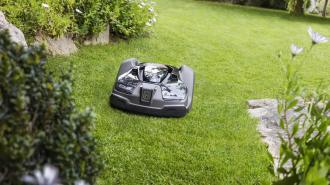While it’s culturally ingrained in some places — and, admittedly, aesthetically pleasing — the lawn is not exactly natural. Curated, fertilized, and managed with noisy gas-powered mowers and weed whackers, the lawn is also thirsty: lawn grass is the single largest irrigated crop in America, per the Xerces Society.
That neat, lush grass is something of a desert for pollinators like bees, who require flowers; pesticides often finish the job when a poor habitat does not. As science and society begins to better understand the cost of our manicured monocultures, the idea of letting nature do its thing — “rewilding” — is beginning to, well, bloom.
While it’s culturally ingrained in some places — and, admittedly, aesthetically pleasing — the lawn is not exactly natural.
And now there’s an unexpected new entrant into the let-your-lawn-go-wild movement: Sweden’s Husqvarna, which manufactures outdoor landscaping and power tools in a signature safety-orange hue.
The company has announced a new rewilding feature for their robot lawnmowers — they’re like revved-up Roombas that use guard wires and GPS to automatically mow your lawn. The rewilding mode will set up a no-touch zone, allowing an area of natural growth meant to encourage the return of bees, butterflies, beetles, and other crucial creepy-crawlies.
Calling on the wild: The concept behind rewilding is graceful in its simplicity: let nature do what it does.
This may involve letting natural growth return; in East Anglia, in the UK, farmers and landowners are cooperating to collectively surrender chunks of their land back to the wild. It may sometimes mean giving the environment a helping hand, perhaps by reintroducing native species on the brink.
Advocates like Rewilding Britain say the practice can combat climate change, by capturing more carbon in the air; create a chain of habitat zones for animals to use as they navigate changing climate and environments; help restore local biodiversity; and provide cleaner water, better protection against flood, and healthier soil.
Movements like No Mow May — which seek to promote rewilding in the spring, right when newly emerging bees need it most — look to get individuals involved, but controversy can ensue, as Axios points out. Unkempt lawns draw the ire of neighbors and local ordinances.
A possible compromise is to let part of the lawn grow wild — splitting the middle between habitats and homeowner associations.
Husqvarna’s rewilding feature will have the automated mowers set aside 10% of your lawn to let nature do its thing — and aid important creatures like bees, butterflies, and beetles.
A turf tithe: Husqvarna’s rewilding feature is designed to allow your robomower to do just that. The feature creates a 10% chunk of the lawn for it to avoid, which can be placed where you want it on the virtual map the mower’s marching orders come from.
The company claims it’s the first to introduce such a feature, and estimates that if 10% of every lawn in Europe were allowed to just grow — admittedly a lofty goal, more fit for marketing materials than reality — it would be an area four times larger than the continent’s largest nature preserve, a distributed haven for insects.
We’d love to hear from you! If you have a comment about this article or if you have a tip for a future Freethink story, please email us at tips@freethink.com.
